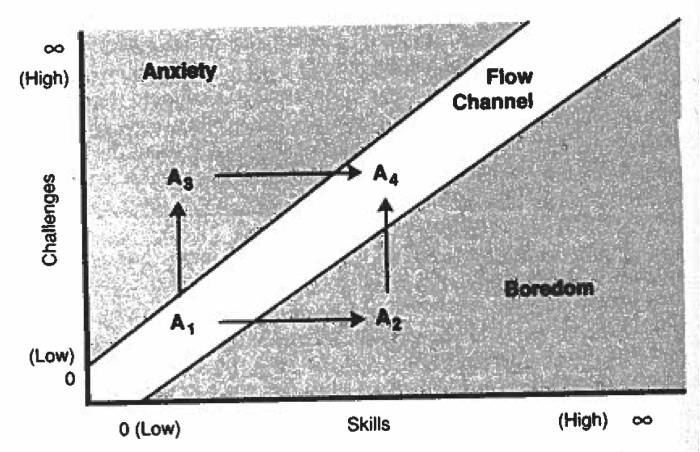
The 10 Minute Experiment That Will Change Your Health (And Life) Forever
Why Your Life Feels Meaningless, Your Work Bores You, And Your Health is Failing
“Collectively we are wasting each year the equivalent of millions of years of human consciousness. The energy that could be used to focus on complex goals, to provide for enjoyable growth, is squandered on patterns of stimulation that only mimic reality. Mass leisure, mass culture, and even high culture when only attended to passively, and for extrinsic reasons… are parasites of the mind.”
-Dr. Mihaly Csikszentmihalyi
There’s one lesser-known factor that massively affects your health: your mind.
We often neglect it because we can’t see it.
We look in the mirror in the morning, and don’t see our thoughts. We see our bellies.
We go throughout our lives and pay attention to the external aspects: how our knees ache, how we need to lose weight, or how we need to dress better or get a promotion.
But we often neglect the inner state.
But a man has studied one of the biggest internal epidemics of our time. I want to share this principle with you because it has the power to entirely revolutionize both your health – and your overall well-being, the feeling of life enjoyment.
The One Tool That Will Change Your Life
Introducing Dr. Csikszentmihalyi – your professor and life changer for the next 5 minutes.
Dr. C spent decades studying human enjoyment, happiness and fulfillment. His research all comes together in a principle called Flow which is universal and is described literally word-for-word by cultures all over the world. It is the state of optimal experience, learning and happiness. He describes flow as that state when:
“…instead of being buffeted by anonymous forces, we do feel in control of our actions, masters of our own fate. On the rare occasions that it happens, we feel a sense of exhilaration, a deep sense of enjoyment that is long cherished and that becomes a landmark in memory for what life should be like. This is what we mean by optimal experience. It is what the sailor holding a tight course feels when the wind whips through her hair, when the boat lunges through the waves like a colt — sails, hull, wind, and sea humming a harmony that vibrates in the sailor’s veins. It is what a painter feels when the colors on the canvas begin to set up a magnetic tension with each other, and a new thing, a living form, takes shape in front of the astonished creator. Or it is the feeling of a father has when his child for the first time responds to his smile.”
It’s that feeling of being in control.
It’s that feeling when you’re so engrossed in doing something you love, that you forget you are doing it.
It’s that feeling when you’re with someone you love and time evaporates.
It’s that feeling when you do an activity that intrigues you so much you could spend all afternoon doing it and feel just as fresh as when you began.
Here’s The Big Problem

The problem is that many of us are miserable because our lives are lacking flow. We show up to jobs we hate, return home to dull the senses with TV, drugs or alcohol, and largely live boring existences that don’t inspire us.
We don’t nearly access this state where we feel alive – where it all seems to make sense and come together. We feel like life is a bit meaningless and pointless.
As you can tell, this takes a dramatic toll on your health and quality of life.
So in the next few minutes, I’m going to show you how to access the flow state – which I hope will be the biggest revelation you have all year.
To access flow, everything you do needs to have three criteria:
- It must be an activity with a clear set of goals and progress
- The task must give you clear and immediate feedback – so that you can adjust what you’re doing to re-enter flow
- The task must be challenging enough that it provides interest/stimulation… but must not be so hard that causes anxiety
Tired of a Meaningless/Boring Life? Accessing The Magical Flow State in Daily Life
Many of us complain about how boring and meaningless and pointless our lives seem. We go to our 9-5… but what about our 5-9? We often just watch TV, relax, or engage in some kind of “wind down” leisure pursuit. It’s not engaging or challenging, but it keeps us busy.
But what’s interesting is that Dr. C. found that we are most often unhappy in our free time! (A similar study found that teenagers with the most free time were often the most unhappy).
When he studied hundreds and thousands of people to compare how often they were in “flow” at work, compared to after work, they found that even though people said they were less happy at work, they actually were more happy.
The problem is that many of us are obviously not in flow in our free time.
Remember the 3 qualities of flow? The activity needs to have clear goals, there must be clear feedback, and it must be challenging.
Let me give you an example: sports.
Sports (whether that means tennis or rock climbing) has been one of the most ancient ways that people get into flow.
For example, let’s say you’re learning tennis.

At first, everything is hard and you’re in flow. Your goal is to hit the ball over the net, and it’s not easy. It takes a LOT of focus and concentration to make that happen. You’re in A1.
But then what happens? After a few weeks, you can hit the ball over the net. It gets easy. You get bored and complacent. You’re out of flow (A2).
To re-enter the state, you need to increase the difficulty or complexity. So in the case of tennis, now you need to hit the ball over the net and get it into a specific box. It takes focus once again, and now you’re really needing concentration to take your skills to the next level. You’re back in flow. (A4)
So to stay in flow (and thus be the happiest and healthiest), you need to constantly make sure you are being stretched and challenged.
Think about this in life:
- Are your daily activities leaving you in the “bored” column? What would you need to do to re-enter flow and make your free time more engaging, requiring more focus and concentration?
- What kind of new hobbies can you pick up to enter flow and keep yourself challenged? Maybe that means a physical fitness challenge, or maybe it just means gardening or picking up chess. The key to staying in flow is to maintain challenges in life
Hate Your Job? Accessing The Magical Flow State at Work

Dr C. then talks about people that LOVE their jobs, no matter what (imagine that). He calls them “autotelic workers.”
Autotelic workers have an inherent (read: can be learned) ability to find enjoyment and focus not only in work but in leisurely pursuits as well. They tend to:
- Rarely differentiate work from free time
- Find enjoyment in everything they do
- Possess the ability to create flow experiences even in surprisingly inhumane environments
And then he mentions jobs that are naturally flow producing – Autotelic jobs:
- Surgery
- Hunting
Surgeons have reported extremely high levels of satisfaction and involvement with their jobs and overall lives. This is partly because the job is so meditative and flow producing, it requires so much concentration, that it leaves the surgeon feeling in control and alive.
The criteria for flow inherently exist in surgery: clear goals, clear immediate feedback, a task that is slightly above the skill level and is challenging, and clear indicators of when the task is done. = loving your job.
Additionally, hunting has been found so enjoyable that people have continued to hunt despite the fact that the need has entirely disappeared. Hunting has been putting people in the zone since the dawn of time — you have a clear goal (kill the animal and eat it), clear feedback (have I killed it yet, or did I miss my shot?) and the task is always that — a task. It is never easy, and it inherently stretches you beyond your skill level. These are all critical to enter the flow state.
Following me?
So here’s how to make your job naturally flow-producing, so that you can tolerate it (or enjoy it) more:
#1 Structure your work more like a surgeon’s
- Like the surgeon, what job tasks can you engage in that actually challenge you and are slightly above your comfort zone? If you don’t have any… ask for some.
- Next, are you getting feedback on the project you’re working on? E.g. if you’re working on a presentation, it has a clear beginning and end. That’s critical to staying in flow. If what you’re working on doesn’t have these things, create micro goals.
- Find tasks to do at work with clear goals, deadlines, and feedback. Don’t just aimlessly sit down to work with no structure. That’s the quick route to boredom and unhappiness.
#2 Develop an autotelic personality
- People with autotelic personalities teach themselves to have fun no matter what they do (like children)
- View (and treat) everything you do as a game – play more often
The reality is that many of us hate our jobs because we aren’t challenged, we aren’t learning, we aren’t pursuing work that actually means anything to us, and we don’t have clear goals or deadlines.
Keeping the feeling of “the hunt” in mind will help bring you back into that state.
The 10 Minute Test to Change Your Life

Many of you may be wondering how to actually apply this.
Well I decided to do an experiment on myself that you can replicate too.
I set an alarm at 5-7 times throughout the day, and when it went off I recorded how I felt, what I was doing, and whether or not I was in flow.
So my daily alarm schedule looked like this:
- 9 am — Feeling: Currently doing: In Flow?
- 11 am – Feeling: Currently doing: In Flow?
- 1 pm – Feeling: Currently doing: In Flow?
- 3 pm – Feeling: Currently doing: In Flow?
- 5 pm – Feeling: Currently doing: In Flow?
- 7 pm – Feeling: Currently doing: In Flow?
- 9 pm – Feeling: Currently doing: In Flow?
A lot of the time, my answers looked like this:
9 am: Feeling: Bored Currently Doing: Working In Flow? Nope.
But sometimes, an interesting gem popped up, like this:
5 pm: Feeling: Excited, motivated Currently Doing: Writing a free guide In Flow: Yep (For 3-5 hours straight)
6 pm: Feeling: Happy, energized Currently doing: Working out In Flow: Yep
8:30 pm: Feeling: Excited, almost manic excited Currently Doing: Consulting a new biz owner on ways to bring in more customers In Flow: Yes, couldn’t sleep.
4 pm: Feeling: Insanely excited Currently Doing: Preparing a talk for a big conference In Flow: Yes, crazy motivated
7 Pm: Feeling: Light, happy Currently Doing: Making dinner In Flow: Yes
11 Pm: Feeling: Excited, relaxed Currently Doing: Carving a pumpkin In Flow: Yes
… And then after a month I had a list of all the activities that were flow producing for me.
Some were surprising (e.g. I was in flow when working on a project).
Some were not surprising, (e.g. I wasn’t in flow at work – which probably explained why I didn’t like my job at the time).
Once you know what exactly makes up the highest highs and the lowest lows throughout your day, you can structure it more around the moments that are flow-producing, and thus happy, for you.
The One Principle That Will Change The Entire Quality of Your Life (And Your Health)
The truth is that mastery of our mind, our moods, and our happiness will dramatically change your health and the quality of your life. Don’t let it slip away just because you can’t see it. Don’t neglect the inner aspects of your health.
Leave a comment below and tell me more about your work and free time – are you in flow, or do you feel bored and uninspired? What could you do to change that?
I promise you this: the more time you spend in flow, the healthier you will be too.
— Alex
Images via Freedigitalphotos.net


Please do not publish my email address.
I agree, flow is great.
But don’t underestimate the part about “not causing anxiety”.
I love my work, but I’m anxious about it almost everyday. I would be less anxious if I dug into the tasks more, but anxiety can be pretty crippling. And it is a vicious cycle when anxiety causes one to avoid hard work, then the procrastination creates more pressure and stress. This cycle can happen in any area of life – exercise , food, housekeeping, as well as work. I have a hard time justifying spending time in non- anxiety producing tasks, when there is a backlog of more difficult things.
Hi David,
No problem !
Do you mean that you’re anxious because you’re constantly being challenged at work? You’re right, but the tough part about anxiety is sometimes that it’s all in our heads. So sometimes anxiety is self-produced more than anything.
You nailed it 100% when you said “And it is a vicious cycle when anxiety causes one to avoid hard work, then the procrastination creates more pressure and stress.” Have you found a way to work through this?
– Alex
Well, one way is to work on something important but not urgent – being proactive. That kind of work is satisfying but not anxiety- producing.
But it doesn’t change the reality of deadlines. And it doesn’t change the
perfectionism that wants every project to be a masterpiece. Knowing that it probably won’t be a masterpiece ( reality) is helpful on a good self-esteem day, depressing on a bad day ( the internal loop is something like: it won’t be very good anyway, what’s the point?). Coping wih reality requires strength.
And that applies to lots of things: meals, exercise, and filing away last week’s imperfectly realized projects.
I am uncomfortable with 12-step programs for lots of reasons, but “one day at a time part” invaluable ( and very difficult). Difficult to reconcile with long-range goals.
Some psychologist has written about finding the portion of the task that is small enough to not produce anxiety, then completing that portion. Then find another portion, etc. This is a good strategy, but even this requires courage and self-compassion.
Thanks for your committment to helping people.
Hi David!
I agree with the “portion of the task”. Sometimes the easiest things can get the ball rolling such as opening a word processor, writing the title, writing subtitles (in the example of writing). Start with the easiest task. Do that bit you feel more secure about, even if you’ll be writing out of order.
This is funny, I’m in the middle of writing my final year essay on motivation and flow is one of the things I’ll mention. I think another important thing is – if you’re passionate about something, it’s easier to get into flow. It can happen with tasks assigned by someone else but there’ll be more resistance.
I’d say programming is another job that’s a hotspot for flow. Usually you’d write a short code bit and test it right away, so there’s the immediate feedback. And it’s definitely challenging 😉 Only thing is – if you run into a really hard problem, you tend to come out of flow 🙁
And of course, Internet surfing and games can create a flow state easily. They’re just not the most productive activities 😛
Melpenguin,
You are absolutely right. If you actually LIKE what you are doing, motivation is easy 😉 People often complain to me that they are unmotivated at work. I tell them there’s no such thing – they just are in the wrong line of work.
What happens if :
You like the work
You like the place you work
You like the people you work with
But your boss is a massive bell end?
I really like the experiment idea. Im going to give thst a try. Thanks!
My brother suggested I might like this blog. He used to be totally right.
This put up truly made my day. You cann’t consider just how much time I had
spent for this information! Thanks!